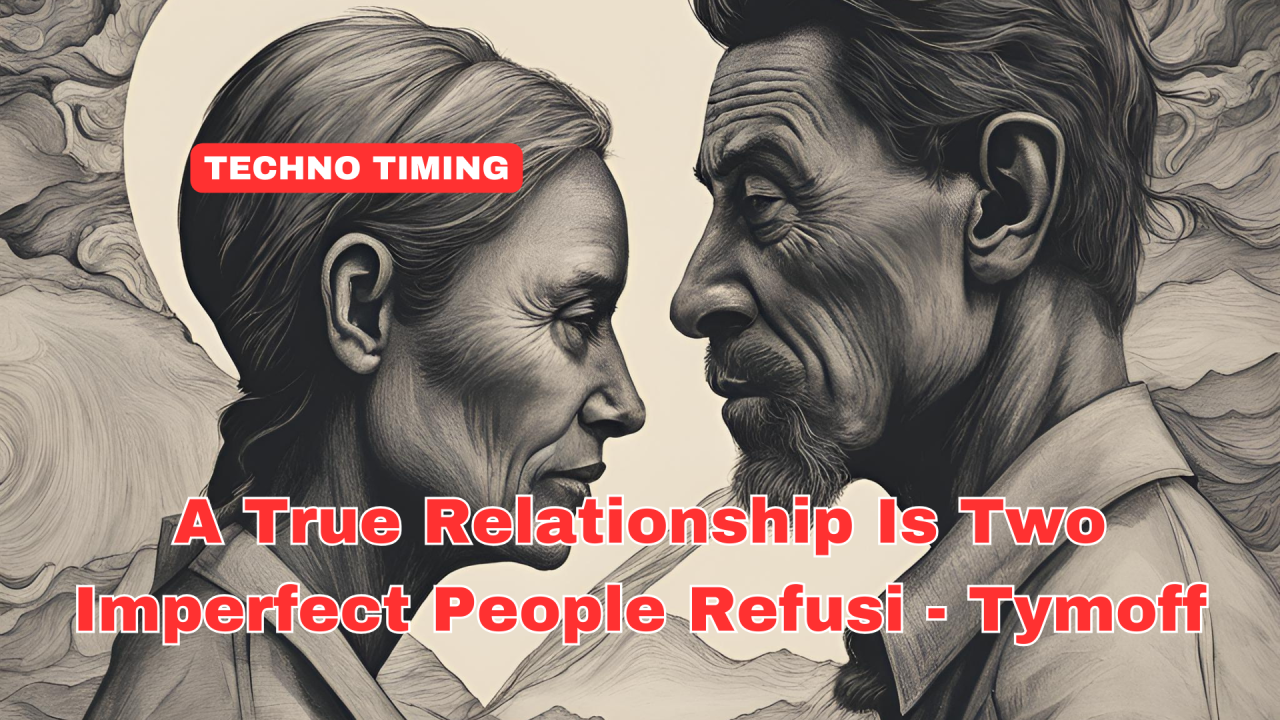In the realm of human connection, the notion that a true relationship is two imperfect people refusing to give up on each other encapsulates. a true relationship is two imperfect people refusi – tymoff the essence of enduring love and commitment. This foundational principle, emboldened by the wisdom of countless imperfect love quotes and real-life experiences, highlights the critical role of authenticity, resilience, and unconditional support in the journey of love. Embracing imperfection not only fosters a deeper understanding and acceptance but also cultivates a ground for growth together amidst relationship challenges. Indeed, the pursuit of such a relationship demands a steadfast commitment in love, highlighting the indispensability of resilience and unconditional love in relationships for forging an enduring connection.
As we delve deeper into what constitutes a true relationship, the subsequent discussion will explore the significance of embracing imperfection, mastering the art of compromise, and the invaluable learning derived from mistakes. Each of these facets contributes uniquely to the tapestry of a relationship built on the foundation of authenticity, underpinned by mutual support and a shared commitment to overcoming relationship challenges together. a true relationship is two imperfect people refusi – tymoff By examining the dynamics of imperfect relationships, this article aims to elucidate the intricacies of true love and resilience, offering insights into how two imperfect people can refuse to let go, thereby crafting an unbreakable bond characterized by enduring love and an unwavering commitment to growth together.
What is a True Relationship?
A true relationship is fundamentally characterized by a deep acceptance and understanding between partners. It involves recognizing and valuing each other exactly as they are, which forms the bedrock for trust and security within the relationship. This acceptance does not mean that flaws are ignored, but rather that they are acknowledged and embraced as part of the individual. Partners in a true relationship are committed to each other despite these imperfections, fostering a love that is unconditional and robust against the trials of life.
Modern Perspectives
In contemporary views, a true relationship transcends the superficial aspects of connection. It is not merely about enduring each other’s quirks but about actively extending kindness, love, and care, even when differences are challenging. This approach to relationships emphasizes the importance of listening and validating each other’s experiences, which are crucial for maintaining a healthy and loving bond. Mental health professionals highlight that such behaviors not only strengthen the relationship but also promote personal growth and understanding within the dynamic.
Key Elements: Understanding and Acceptance
Understanding and acceptance are pivotal in defining a true relationship. These elements involve a mutual recognition of each partner’s individuality, feelings, and perspectives, which fosters a supportive and empathetic environment. True love encourages partners to engage with each other’s experiences genuinely, ensuring that each feels heard and valued. This deep level of empathy and acceptance allows for a connection that is both nurturing and enduring, capable of withstanding the complexities and challenges that life may bring.
Embracing Imperfections
In the journey toward self-acceptance, the concept of embracing imperfections plays a pivotal role. It is essential to understand that perfectionism, often glorified in society, can lead to undue stress and hinder personal growth. By recognizing and accepting our flaws, we cultivate a healthier self-image and foster resilience.
Finding Strength in Flaws
One of the most empowering aspects of embracing imperfections is finding strength in our flaws. This involves shifting from a mindset of relentless self-criticism to one of self-compassion. By treating ourselves with the kindness we would offer a friend, we learn to be gentle during our moments of vulnerability. Acknowledging that challenges and setbacks are universal experiences helps diminish the isolating effects of perfectionism, encouraging a sense of connectedness and shared humanity.
Cultivating Mutual Understanding
In relationships, the practice of embracing imperfections can lead to deeper mutual understanding. Recognizing that no one is flawless allows individuals to connect more authentically. This understanding fosters an environment where partners can openly share their struggles and support each other, thereby strengthening the bond between them. It is through this genuine interaction that individuals can appreciate the totality of their partners—not just their strengths but also their imperfections, which are integral to their identity.
The Art of Compromise
Importance of Concession
In the dynamics of a relationship, concession plays a crucial role, acting as a mechanism through which partners can navigate their differences effectively. A concession is understood as a specific exception from a rule or a response to a demand during negotiations within a relationship. It often involves one partner agreeing to something that the other desires, which, while challenging, is essential for the longevity and health of the relationship. This process of give-and-take is not about losing but about finding a balance where both partners feel their needs and desires are respected.
Mutual Respect in Decisions
Mutual respect is foundational in making decisions that involve compromise. It ensures that both parties feel valued and understood, fostering an environment where open and effective communication thrives. By prioritizing mutual respect, individuals encourage a relationship dynamic where compromises are not seen as losses but as opportunities for enhancing the relationship’s strength and depth. a true relationship is two imperfect people refusi – tymoff This respect is crucial in maintaining a healthy relationship dynamic, where both individuals feel empowered to express their needs and work together to find solutions that honor those needs while fostering collective well-being.
Compromise is not merely about making concessions; it is about creating win-win situations where both parties feel satisfied with the outcome. This approach not only resolves conflicts but also strengthens the bond by building trust and cooperation. By embracing compromise, partners demonstrate their commitment to the relationship and to each other, ensuring that both individual and shared goals are addressed.
Learning from Mistakes
Acknowledging Errors
In the journey of a relationship, recognizing and addressing mistakes promptly is a cornerstone of resilience and growth. a true relationship is two imperfect people refusi – tymoff When individuals acknowledge their errors, they initiate a process of self-reflection and mutual understanding. This act is not just about admitting wrongdoing but involves a deeper introspection into the underlying causes of these mistakes. By identifying these triggers, couples can proactively work towards preventing future conflicts and strengthening their bond.
Perseverance Through Obstacles
Perseverance in the face of relationship challenges is a testament to the strength and commitment of the partnership. Couples like Courtney and Stan exemplify this as they navigate through life’s hurdles, including financial strains and personal sacrifices, to achieve their shared goals. Their story highlights how facing obstacles together, with a spirit of teamwork and mutual support, can fortify a relationship and lead to shared successes.
Moreover, adopting a perspective that views challenges as opportunities for growth can transform the way partners perceive and react to problems. Instead of being overwhelmed by difficulties, seeing them as a chance to strengthen the relationship can lead to more constructive resolutions and a deeper connection.
Conclusion
Throughout this discussion, we have explored the profound truth that a genuine relationship is built on the acceptance of imperfection, the embracing of one’s flaws, and the commitment to navigate through life’s challenges together. The essence of true love has been shown to lie not in the absence of imperfection, but in the refusal to give up on each other amidst these imperfections. Through embracing each other’s flaws, learning the art of compromise, and viewing mistakes as opportunities for growth, couples can forge an unbreakable bond characterized by resilience, understanding, and a deep mutual respect.
As we reflect on the dynamics of true relationships, it becomes clear that the journey of love and commitment is about more than just weathering storms together; it is about building a foundation of trust, empathy, and unconditional support that allows love to flourish in its most authentic form. a true relationship is two imperfect people refusi – tymoff This exploration underscores the significance of embracing imperfection in building a lasting connection and highlights the importance of continuous growth and understanding. By staying committed to the journey of love, two imperfect people can indeed create a relationship that is both enduring and deeply fulfilling.
FAQs
What does the term ‘relationship’ mean?
A relationship refers to the connection or interaction between two or more people. This can manifest as a professional dynamic, such as the relationship between colleagues, or a personal bond, like that between family members or romantic partners.
How would you define a relationship in the context of life?
In life, a relationship signifies any kind of link between two individuals, which can range from positive to negative. This encompasses various types of connections, such as those with family, friends, or acquaintances.
What are the ways in which relationships are formed?
Relationships can begin through various means such as proximity, physical attraction, perceived benefits, similarities or differences, and personal disclosure. They typically deepen through the sharing of personal information and building mutual trust but can end due to separation or other forms of dissolution.










